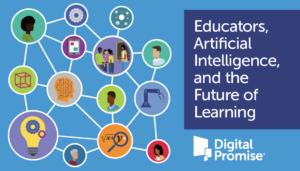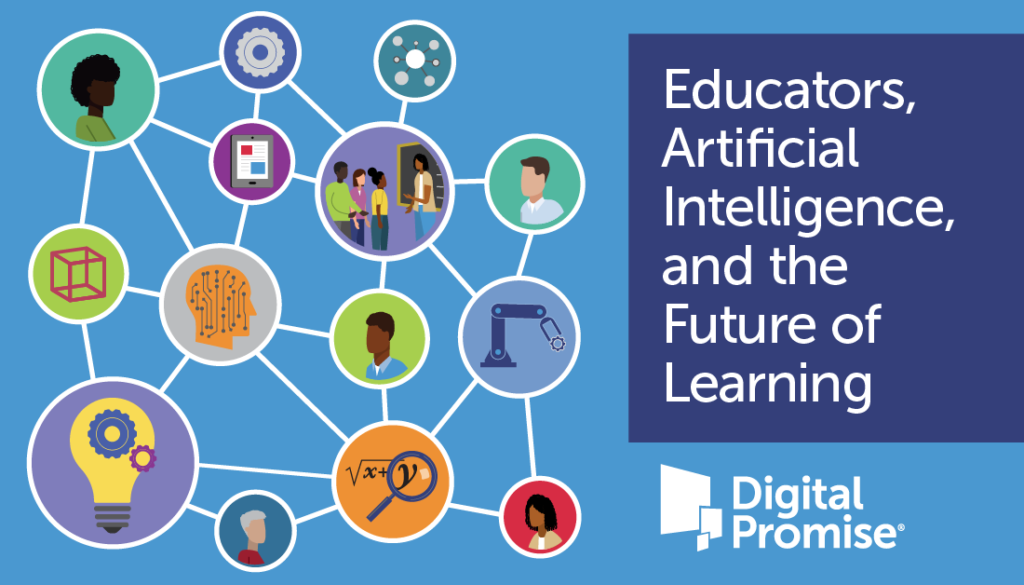Educators, Artificial Intelligence, and the Future of Learning
Learn more about TeachFX:
- How voice AI can help create more equitable classrooms by Jennifer Carolan
- Every minute counts, especially for English learners by Kristin Pierce
- Discourse in the Japanese vs. American math classroom by Daniel Lee
 Visions for how AI can support teachers and classrooms:
Visions for how AI can support teachers and classrooms:
- Robots and Agents to Support Collaborative Learning by Sandra Okita and Sherice N. Clarke
- Virtual Peers and Coaches: Social and Cognitive Support for Learning by Judith Fusco, Wendy Martin, H. Chad Lane, and Catherine Chase
- Pedagogical Agents: Back to the Future by W. Lewis Johnson and James Lester
Meet the Practitioner Panelists:
Kip Glazer, Ed.D.
Principal, San Marcos High School, Santa Barbara, CA
Twitter: @kipglazer
Kip Glazer, Ed.D. is a High School Principal in Santa Barbara, CA. She had been a classroom teacher and technology coach prior to becoming a school administrator. She is a native of South Korea and moved to the United States as an adult. Her experience of being an immigrant who learned to speak English as an adult has shaped her personal and professional identity.
She has a doctorate in Learning Technologies from Pepperdine University. She is interested in all things technology and how they impact learning.
Kip’s Statement on AI:
As a literature lover, I am interested in the good, the bad, and the ugly side of technologies that have been extensively explored in science fiction. As much as I see the potential for incredible benefits of AI in the classrooms to support the teachers and students alike, I am equally concerned about its misuse by people whose intentions may not align with the mission of public education. I firmly believe that teachers and administrators must be provided with the right type of training to be able to support all our students, and we all have an important role to play when it comes to creating the future with AI.
Pati Ruiz, Ed.D.
Researcher, Digital Promise
Twitter: @pati_ru
Pati Ruiz is a researcher with the Learning Sciences Research team. Prior to joining Digital Promise, Pati spent 16 years as a high school computer science teacher, Spanish teacher, and K – 12 administrator. Pati has also taught public school leaders and pre-service teachers in both the U.S. and Mexico and helped design online learning experiences for computing and information technology faculty focused on diversifying undergraduate computing programs.
Pati’s Statement on AI:
As a former Spanish and computer science teacher, I think a lot about emerging technologies and how they apply in learning contexts. Recently, I have been focused on AI and how it affects students, their families, and communities. I am particularly interested in the consequences (intended and unanticipated) of these emerging AI technologies on historically excluded students, specifically Latinx, Black, Indigenous, and students with disabilities. Working with the Center for Integrative Research on Computing and Learning Sciences (CIRCLS), I have seen work ranging from Intelligent Tutors and systems designed to adapt and personalize learning, including some that are developing pedagogical agents and robots. I’ve also seen work that seeks to minimize bias and promote equity in AI, projects using computer vision, natural language processing and speech technologies. Of all of these efforts, I consider the work to promote equity and accountability in AI to be the most important and I created this list to focus on those issues.
Kelly Thomas
Special Education Teacher, Newport News School District (VA)
Kelly Thomas is currently a Special Education teacher in Newport News, VA. Previously, she worked as a Customer Operations Manager for Sentara Health Plan for ten years. Kelly also owned and operated her own daycare home for seven years which sparked her love of teaching. She started in elementary education as an instructional assistant before obtaining her Bachelor’s degree and teacher certification. She has been in education for more than twelve years in one capacity or another.
Kelly’s Statement on AI:
Before TeachFX, my direct instruction approach could be described as traditional, as it pertained to the ratio of teacher talk to student talk. I taught lesson content material and my students responded when asked to do so. Students were and still are encouraged to demonstrate lesson mastery in a “I do, We do, You do” gradual release method. The goal was and is for students to skillfully move from dependence to interdependence to independence. Now, thanks to Teach FX, my students feel more empowered to create and drive their learning experience. Teach FX has helped me become a skilled practitioner and/or facilitator towards that end. I now am aware of the ration between my teacher talk time and my student’s talk time. As a special education teacher, I am very aware of the importance of wait time, however I hadn’t considered that wait time occurs both after I speak as well as after my students speak. I am becoming more comfortable with periods of silence which used to be very uncomfortable for me. I find now that my students are more engaged with each other as well as myself! I love teaching and my students grow and thrive daily as they demonstrate their love of learning!


